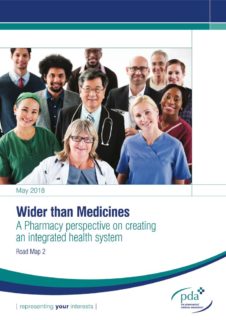The ambitious plan includes measures to improve care for patients of all ages and aims to achieve objectives by employing new ways of working, improved disease prevention, workforce development, use of digital technology and making best use of tax payers’ money.
The PDA is pleased to note the inclusion of pharmacists in the plan and the recognition that they will be essential for its’ delivery.
Investment is promised to significantly increase the number of pharmacists working in primary care networks, the new general practice groups which will cover populations of 30-50,000. We hope that this investment will provide a minimum of a full-time pharmacist for every 15,000 patients so that those pharmacists can make a real difference to the practices which they support and become truly embedded within practice teams.
Community pharmacists will contribute to acute and urgent care services and public health initiatives including support for health checks, but we believe that they could do much more given the right training and contractual framework.
There is the promise of improved NHS IT infrastructure and we trust that this will result in full read-write access to patient records for all pharmacists providing NHS commissioned care as soon as is practicable.
While welcoming the development of a long-term plan, the PDA does have a number of concerns:
- Whilst investment is promised for ‘clinical pharmacists’ in the primary care networks community pharmacy will be subject to further ‘efficiencies’. We hope that these efficiencies will not threaten the presence of pharmacists in community pharmacies at the heart of their local communities providing expert advice and support to customers and patients both for prevention and treatment. We do not believe the NHS will be able to meet rising demands without utilising this workforce more imaginatively alongside the innovative use of new technologies.
- We are somewhat dismayed at the continued use of the word ‘clinical’ to distinguish pharmacists working in general practice from those working in community pharmacies. All pharmacists can and should provide clinical input. Sadly, the employment and working conditions for some community pharmacists hampers their ability to use clinical skills to their full extent. This is not their fault and implying that no clinical input takes place in community pharmacy is unhelpful and inaccurate.
- The plan fails to detail how much community pharmacy could contribute to national healthcare if commissioned effectively. That workforce gives patients the most accessible health professionals anywhere in the NHS – physically on the high street and patients able to walk in without an appointment. Where the plan talks about improving the efficiency of this key part of the health service, we hope that means a focus on making full use of these professionals to achieve better outcomes rather than reducing their number and cutting costs. We also believe that threatening the future of community pharmacies is hugely short-sighted for the communities they serve.
- There are several activities which the paper ascribes to ’clinical’ pharmacists in primary care networks but which we believe could (and should) also be provided by pharmacists in the community pharmacy network to spread the load. Indeed, we believe the workload will be unmanageable without the appropriate use of the whole pharmacy workforce. The PDA has been in talks with all the key pharmacy organisations regarding how community pharmacy can move to a more outcomes-focused model which would support this.
- We are not assured that the additional resource allocated to the NHS in the plan is sufficient to meet the spiralling costs which increasing demand has brought and this will only be exacerbated by the significant vacancies affecting the NHS workforce and the reductions in the social care budget.
- We note from responses to the paper in the pharmaceutical press that some key pharmacy organisations which we would expect to be sighted on all of the key pharmacy-related content do not appear to have known about some issues such as the ‘efficiencies’ planned for community pharmacy. This appears to follow a depressing pattern of DHSC developing policy in a vacuum or only seeking to consult with select like-minded individuals and organisations rather than all relevant representative organisations. This approach damages the profession as a whole and limits what could otherwise be achieved.
“The PDA welcomes the inclusion of pharmacists in the 10-year plan and believes they have much more to offer across all healthcare settings”, said Alima Batchelor, Head of Policy at the PDA. “However, the failure to consult fully with key pharmacy organisations and to appreciate the contributions which all pharmacists could make is a sad reflection of the rather divisive view of the profession currently harboured within DHSC. We reiterate that all pharmacists should be qualified health professionals using clinical skills towards patient care.”
“Our discussion document Wider than Medicines sets out a proposal for how pharmacists in all primary care sectors might work in an integrated fashion to optimise medicines related care”, Alima continued.
Download the NHS long-term plan here

